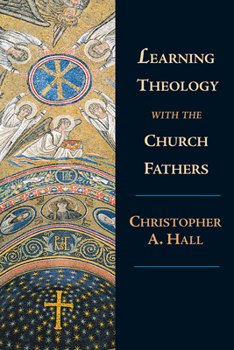Learning Theology with the Church Fathers
Select Format
Select Condition 
Book Overview
Christopher A. Hall offers you the opportunity to study theology and church history under the preaching and instruction of the early church fathers.
Format:Paperback
Language:English
ISBN:0830826866
ISBN13:9780830826865
Release Date:August 2002
Publisher:IVP Academic
Length:308 Pages
Weight:1.02 lbs.
Dimensions:0.9" x 5.5" x 8.2"
Customer Reviews
4 ratings
Good Balance of Scholarship and Heart
Published by Thriftbooks.com User , 15 years ago
Hall does a great job of blowing the dust off these ancient writings and succinctly demonstrating why they are still very relavent even today. In addition to being a Patristic scholar, he is also a writer with the skill to make one feel like they are meeting in person the authors being studied. He also contrasts how the writings are to be understood in the context of the time they were written and the issues they tried to address. Without such insight one might think several of the writers directly contradict each other when they do not. An excellant read for even the beginner and highly recommended!
Needed Bridge to the Past
Published by Thriftbooks.com User , 20 years ago
Learning Theology is the second in Christopher Hall's three-volume introduction to patristic theology. The first volume, Reading Scripture with the Fathers, recounts the approaches to biblical exegesis of eight theologians of the catholic tradition. The third proposed volume, Praying with the Church Fathers, will examine the spiritual disciplines and worship of the ancient church. Learning Theology explores the major loci of Christian dogmatics, (for example, the Trinity, Christology, ecclesiology, soteriology) as articulated by major patristic theologians. Hall confesses up front the problematic nature of the division of the trilogy. On the one hand, the Fathers would not have separated dogma from Scripture. On the other hand, theology for the Fathers was never separated from the life of piety. Rather, faithful theology arises only out of the life of spiritual discipline and within the corporate worship of the Church. As a "primer for beginners," Learning Theology must, for pedagogical purposes, operate within this artificial division.One of the strengths of the book for which Hall deserves commendation is the range of the audience for whom he has written. Although he assumes that it might serve as an introduction for seminary students, it does not replace the classic introductory textbooks on patristics, such as J. N. D. Kelley's Early Christian Doctrine or Francis Young's From Nicaea to Chalcedon. Hall is not interested in explaining the historical development of Christian doctrine. The ideal audience for this volume is two fold: first, pastors who have been out of seminary for some time but now want to explore how the wisdom of the patristic traditions might aid their proclamation of the gospel; and second, curious laypersons who wish to explore the language of the Church they have heard in the creeds, hymns, or sermons but have never understood. More specifically, the pastors and laypeople to whom Hall is writing are those whose religious roots are evangelical. Himself an evangelical, Hall hopes to correct the tendency to place confidence in a "highly individualistic" approach to exegesis that suffers from "theological and historical amnesia" (24).At the same time, Hall is conscious to address attitudes towards theology common among most contemporary Christians. He therefore begins his discussion of each locus explaining why it is relevant to the modern reader. For example, in his chapter on the Trinity, he begins by quoting Thomas Jefferson's dismissive judgment that the Trinity is "incomprehensible jargon" and Kant's insistence that the Trinity "provides nothing, absolutely nothing, of practical value" (53). Having exposed the reader's prejudice, he uses Nazianzen's Theological Orations and Augustine's De Trinitate to explicate the logic and boundaries for the Christian's contemplation of and speculation about the mystery that is the Trinity. Hall also demonstrates his sensitivity to problems in Christian God-talk that feminist theologians
Theology based on "The Faith Once Delivered"
Published by Thriftbooks.com User , 21 years ago
Probably more books have been written in the last 50 years on "pop theology" in the religious book market than any other type of book. Now here is a book on the ancient faith that was delivered to the ancient church. It is not "easy beliveism" but is rich with the words of the Apostles and those who sat at their feet.Both comforting and challenging, it is a most valuable resource for a serious seeker.
Great introductory text!
Published by Thriftbooks.com User , 22 years ago
This book is the second in a three part series surveying the various aspects of early church history.Book 1 - Reading Scripture with the Church Fathers (examination of various hermeneutical methods, focusing upon the differing schools of Alexandria and Antioch).Book 3 (forthcoming) - Praying with the Church Fathers (deals with sacramentology and pietism among other things).This second book details with the basic components of theology, showing how the fathers wrestled through the major issues. HOWEVER, this book does not detail all the major players. Hall instead has opted to take the major names associated with the various positions and deal with those two (or three) in detail, rather than having to paint broad strokes about everyone.Among the issues are:(1) Christ the Son, Begotten and Not Made(2) Mystery and Wonder of the Trinity(3) Christ Divine and Human(4) Holy Spirit(5) Sin, Grace and the Human Condition(6) Providence(7) The Sacred Scriptures(8) One Holy, Apostolic Church(9) Resurrection and Eternal LifeOne of the things I like best about this book is its broad appeal. It not only deals with the heady theological problems, but also seeks to affect the heart as well. Consequently, whether you're well versed in historical theology or not, you should read this book (meditatively) at least once. You will not regret it.





